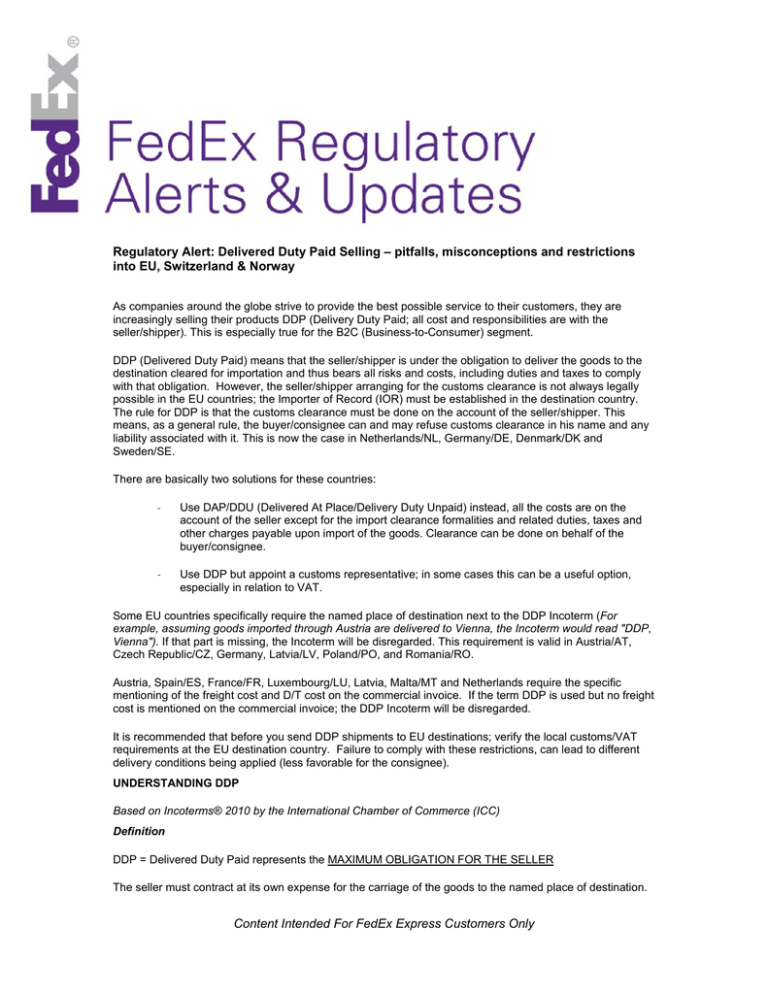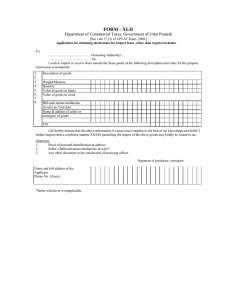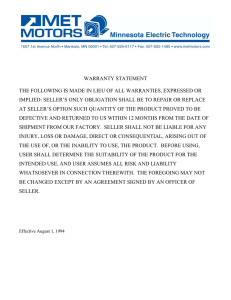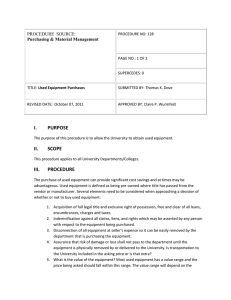Delivered Duty Paid Selling - FedEx Small Business Center
advertisement

Regulatory Alert: Delivered Duty Paid Selling – pitfalls, misconceptions and restrictions into EU, Switzerland & Norway As companies around the globe strive to provide the best possible service to their customers, they are increasingly selling their products DDP (Delivery Duty Paid; all cost and responsibilities are with the seller/shipper). This is especially true for the B2C (Business-to-Consumer) segment. DDP (Delivered Duty Paid) means that the seller/shipper is under the obligation to deliver the goods to the destination cleared for importation and thus bears all risks and costs, including duties and taxes to comply with that obligation. However, the seller/shipper arranging for the customs clearance is not always legally possible in the EU countries; the Importer of Record (IOR) must be established in the destination country. The rule for DDP is that the customs clearance must be done on the account of the seller/shipper. This means, as a general rule, the buyer/consignee can and may refuse customs clearance in his name and any liability associated with it. This is now the case in Netherlands/NL, Germany/DE, Denmark/DK and Sweden/SE. There are basically two solutions for these countries: ‐ Use DAP/DDU (Delivered At Place/Delivery Duty Unpaid) instead, all the costs are on the account of the seller except for the import clearance formalities and related duties, taxes and other charges payable upon import of the goods. Clearance can be done on behalf of the buyer/consignee. ‐ Use DDP but appoint a customs representative; in some cases this can be a useful option, especially in relation to VAT. Some EU countries specifically require the named place of destination next to the DDP Incoterm (For example, assuming goods imported through Austria are delivered to Vienna, the Incoterm would read "DDP, Vienna"). If that part is missing, the Incoterm will be disregarded. This requirement is valid in Austria/AT, Czech Republic/CZ, Germany, Latvia/LV, Poland/PO, and Romania/RO. Austria, Spain/ES, France/FR, Luxembourg/LU, Latvia, Malta/MT and Netherlands require the specific mentioning of the freight cost and D/T cost on the commercial invoice. If the term DDP is used but no freight cost is mentioned on the commercial invoice; the DDP Incoterm will be disregarded. It is recommended that before you send DDP shipments to EU destinations; verify the local customs/VAT requirements at the EU destination country. Failure to comply with these restrictions, can lead to different delivery conditions being applied (less favorable for the consignee). UNDERSTANDING DDP Based on Incoterms® 2010 by the International Chamber of Commerce (ICC) Definition DDP = Delivered Duty Paid represents the MAXIMUM OBLIGATION FOR THE SELLER The seller must contract at its own expense for the carriage of the goods to the named place of destination. Content Intended For FedEx Express Customers Only The seller must also pay, where applicable, the cost for customs formalities necessary for export and import as well as all duties, taxes and other charges payable upon export and import of the goods and the cost of transport through any country prior to the delivery. Customs formalities: The above requirements are to be met in order to comply with any applicable customs regulations and may include documents, security, information or physical inspection obligations. The parties are well advised not to use DDP if the seller is unable directly or indirectly to obtain import clearance. Where applicable, the seller must obtain at their own risk and expense, any export and import license and other official authorization, and carry out all customs formalities necessary for the export of the goods for their transport through any country and for their import. Advisory References: Incoterms® 2010 publication of the International Chamber of Commerce Must be purchased in order to view Content Intended For FedEx Express Customers Only


